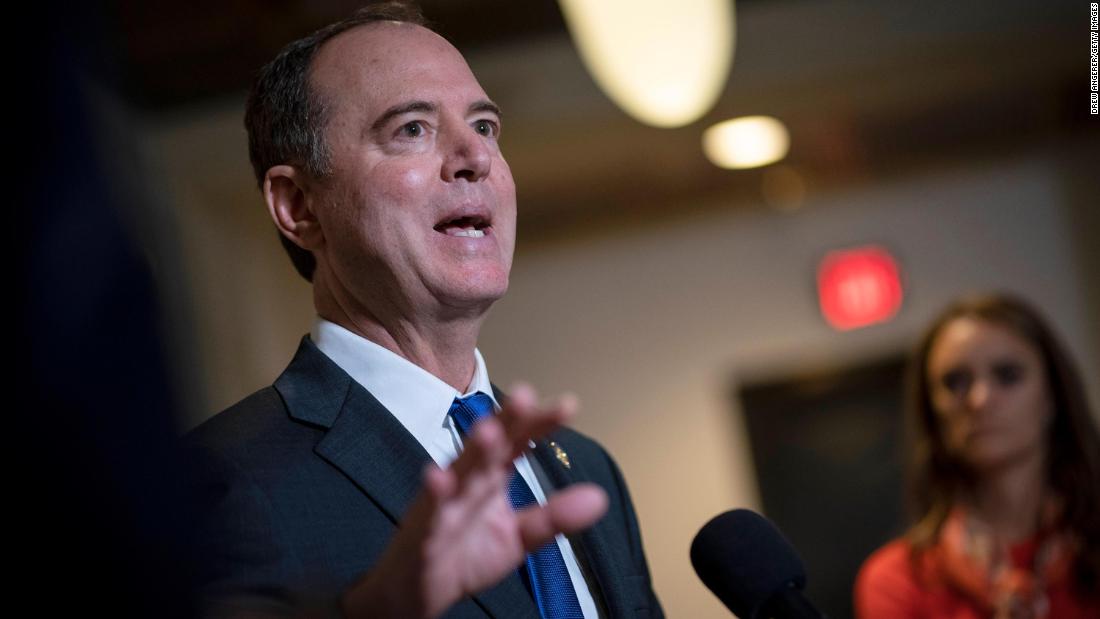[ad_1]
Republicans, meanwhile, are turning from protesting the impeachment process to arguing that the Democrats’ case simply doesn’t add up, since Trump and President Volodymyr Zelensky both say there was no pressure campaign and that Ukraine ultimately received the aid money.
Can Democrats successfully make their case for impeachment?
A Democratic aide said Democrats are telling a “very simple story” that the President abused his office and his presidential powers.
Democrats are betting that in this case, unlike with Mueller, the “movie version” of the testimony playing out in a hearing room will successfully bring the story to life for people who didn’t “read the book.”
Will the hearing format help Democrats break through?
Democrats hope the 45-minute blocks will give them the time to walk witnesses through their full stories like they were able to do in the closed-door depositions, where the majority and minority alternated hourlong and 45-minute rounds. The format also means that Democrats will get to lay out their case with the witness for a full 45 minutes without GOP interruption, before Republicans then get to do the same to try to push back against the Democratic arguments. It’s a format that was also used during the impeachment hearings for President Bill Clinton two decades ago.
The rules include another key distinction to allow Intelligence Chairman Adam Schiff, a California Democrat, and ranking Republican Rep. Devin Nunes, also of California, the ability to tap committee staff attorneys to ask questions, which both are expected to do. That means that two relatively unknown congressional aides — Daniel Goldman, the Intelligence Committee’s director of investigations, and Steve Castor, the House Oversight Committee GOP counsel — will be two of the most prominent faces in the public impeachment hearings.
Goldman and Castor have led questioning during the closed-door depositions, so they will be well prepared for their moment, even if the notion of outshining lawmakers at hearings will be a foreign one. The Republicans even made Castor a shared aide for the Oversight and Intelligence committees to allow him to participate.
Can Republicans mount a defense of Trump?
For weeks, House Republicans have decried the closed-door Democratic impeachment process, accusing Schiff of running an illegitimate, secretive inquiry to overturn the results of the 2016 election.
- The July 25 call summary “shows no conditionality or evidence of pressure.”
- Zelensky and Trump “have both said there was no pressure on the call.”
- Ukraine “was not aware of the hold on US assistance” during the July 25 call.
- The hold on US aid was lifted on September 11, 2019, without an investigation into Biden.
How do the witnesses come across?
The public takeaway that comes out of the impeachment hearings will depend in large part on the witnesses sitting across from lawmakers: longtime career officials who remain at the State Department. The officials all expressed concern and alarm at the campaign led by Giuliani to remove Yovanovitch and then to push for political investigations.
Rep. Lee Zeldin, a New York Republican who has been a key participant in the depositions, said Tuesday that Taylor was not credible because his account was based on “second-, third- (and) fourth-hand information.”
Democrats, however, are likely to point to the fact that Taylor’s account has been corroborated by other witnesses, including Morrison, who did not take issue with the July 25 call itself. And Taylor explained in his deposition that he took meticulous notes of his conversations — meaning his account of what happened over the past few months was not as hazy as others, like Sondland.
The question of witness credibility will be key for every public impeachment hearing, but perhaps none more than the first day with Taylor. If he comes across as credible and compelling, it will go a long way to helping Democrats make their impeachment case.
What does Trump’s counterprogramming look like?
This is the first social media impeachment proceeding, and the first where the President’s Twitter feed gives him the ability to respond unfiltered and in real time to the televised hearings.
Trump has tweeted repeatedly on impeachment in recent weeks, with frequent attacks on Schiff and Pelosi, questions about why the whistleblower isn’t coming forward and complaints that Democrats are trying to impeach him over a “perfect” phone call.
His Twitter feed will be a wild card for both sides.
What’s more, the President has a joint news conference scheduled with Turkish President Recep Tayyip Erdogan following their meeting at the White House on Wednesday, giving him a potentially prominent platform to respond to the impeachment hearings.
Trump’s news conference could create quite the split screen for day one of the public hearings.
CNN’s Manu Raju and Phil Mattingly contributed to this report.
[ad_2]
Source link





